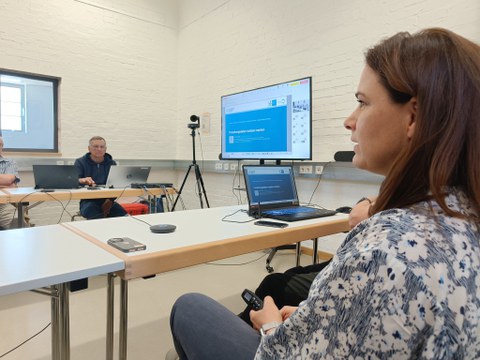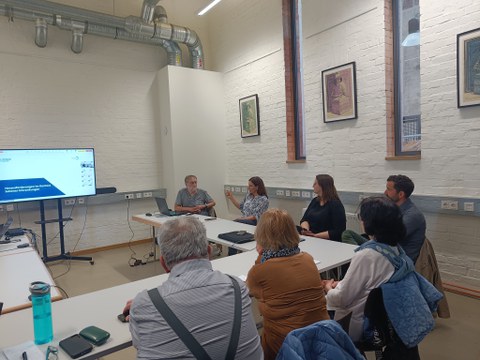Apr 22, 2025
Review: MiHUBx Strengthens Digital Health Literacy Among Older Citizens with Lecture on the Use of Medical Data
As part of a lecture series organized by the Dresden Senior Citizens’ Academy, around 20 interested participants gathered on the morning of April 22, 2025, at the Media Culture Center Dresden to learn about the responsible use of medical data. The event was specifically organized by MiHUBx staff (https://mihubx.de/) to address digital medical topics relevant to citizens and patients and to enhance digital health and data literacy.
Under the theme "Using Health Data for Research," three expert presentations highlighted key aspects of digital data processing in the medical context — from consent and data sharing to their use in research. The primary goal was to raise awareness among older adults about digital topics in medicine, spark curiosity about digital innovations, and at the same time, reduce fears and prejudices surrounding digitalization. Another important objective was to foster transparency: What happens to health data once it is released for research? How is it protected? What insights can be gained?
Philipp Heinrich, head of the Independent Trust Office Dresden (https://tu-dresden.de/med/mf/forschung-internationales/forschungsunterstuetzung/unabhaengige-treuhandstelle), explained how health data can be made available for research and what (data) protection measures are in place — offering a hands-on overview of how the trust office operates.
Dr. Ines Reinecke, head of the Data Integration Center at the University Hospital Dresden (https://www.uniklinikum-dresden.de/de/das-klinikum/universitaetscentren/zentrum-fuer-medizinische-informatik/zentrum/diz), described the complexity of different "data languages" in everyday clinical practice and discussed the challenges posed by diverse data structures in clinical care. She also highlighted both technical and ethical issues related to data integration.
Michéle Zoch, a research associate at the Institute for Medical Informatics and Biometry at TU Dresden, presented concrete examples from research on rare diseases. She demonstrated how care data has already been successfully used to improve diagnostics and treatments for rare diseases and pointed out ongoing challenges in the field.
The audience’s reactions confirmed the high level of interest in the topic. Many participants took the opportunity to ask in-depth questions and engage in discussion with the experts. The event fostered a stimulating and engaging dialogue between attendees and speakers.
With this event, MiHUBx provided an important impetus for the responsible and informed handling of digital health information. It is part of a broader collection of diverse formats aimed at promoting digital health literacy among various target groups — including patients, medical professionals, and researchers.
Special thanks go to the Dresden Senior Citizens’ Academy, especially Mr. Helmut Lutzmann, for the pleasant collaboration, and to the speakers.


